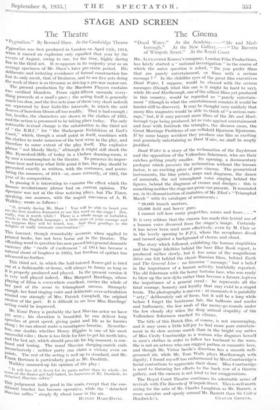The Cinema
"Dood Water." borough." At the New Gallery.—" At the Academy. Me and Marl- borough." Barretts of Wimpole Street." At the Royal Court MR. ALEXANDER KORDA'S company, London Film Productions, has lately started a " national investigation " in the course of which time naive question is asked, " DO you prefer films that are purely entertainment, or films with a serious message ? " In the childlike eyes of the great film executives Deed Water, I suppose, would be classed with the serious messages (though what this one is it might be hard to say), while Me and Marlborough, one of the silliest films yet-produced in this country, would be regarded as " purely entertain- ment " (though in what the entertainment consists it would be harder still to discover). It may be thought very unlikely that many film magnates would be able to think of "a serious mes- sage," but, if it may prevent more films of the Me and Mart- borough type being produced, let us vote against entertainment and bear with fortitude the triangles, the divorce cases, the Great Marriage Problems of our celluloid Bjornson Bjornsoni. If by some happy accident they produce one film as exciting and genuinely entertaining as Dood Water, we shall be amply justified.
• Dood Water is a story of the reclamation of the Zuyderzee and the opposition of time Vollendam fishermen, who see their catches getting yearly smaller. Its opening, a documentary prologue which presents the reclamation without the human factor, is an exciting piece of pure.and diagrams, the dance of g e in et ine c ea l instruments, the blue prints, maps of numerals, the sad triumphant voice singing behind the figures, behind the diagrams of cranes and dredges : this is something neither the stage nor prose can present. It reminded me, in its dramatisation of statistics, of Mr. Eliot's "Triumphal March " with its catalogue of armaments " 28,000 trench mortars, 58,000 field and heavy guns, I cannot tell how many projectiles, mines and fuses . . . " It is very seldom that the cinema has made this lyrical use of a human voice divorCed from the singer's image. Certainly it has never been used more effectively, even by M. Clair or in the lovely opening to F.P.1, where the aeroplanes dived and turned against a background of chorus and cloud. The story which followed, exhibiting the human stupidities and the tragic fidelities behind the bare Blue Book report, is produced rather slowly, .but it has some of the magnificent drive one felt behind time classic Russian films, behind Earth and The General Line : no tiresome " message," but a belief in the importance of a human activity truthfully reported. The old fisherman with the horny tortoise face, who was ready to blow up the new dyke rather than become a farmer, is given the importance of a general creed : he represents all the fatal courage, honesty and loyalty that may exist in a stupid brain. The photography is uneven : at moments it is painfully " arty," deliberately out of focus, but it will be a long while before I forget the boisterous fair, the balloons and masks and buffoonery, the low roofs of the merry-go-rounds under the low cloudy sky when the deep animal stupidity of the Vollendam fishermen reached its climax.
The title of this Dutch film, of course, is not encouraging,, and it may seem a little kill-joy to fluid more pure entertain- ment in its slow serious march than in the bright coy antics of Miss 'Cicely Courtneidge as a wotnan who disguises herself in men's clothes in order to follow her husband to the wars.. She is not an actress who can suggest pathos Or romantic love, and though Mr. Victor Savile's direction has a smooth well' groomed air, while Mr. Tom Walls plays Marlborough with dignity, I found myself too embarrassed by Miss Courtneidge's facial contortions to appreciate their share. Miss, Courtneidge is used to throwing her effects to time back row of a theatre gallery, and the camera is not kind to her exaggerations. Time Royal Court Theatre continues its admirable series of revivals with The Barrette of Wimpole Street. This is well worth seeing for the sake of Mr. Charles Laughton as Mr. Barrett, a' more macabre and openly sensual Mr. Barrett than Sir Cedr:o"






































 Previous page
Previous page